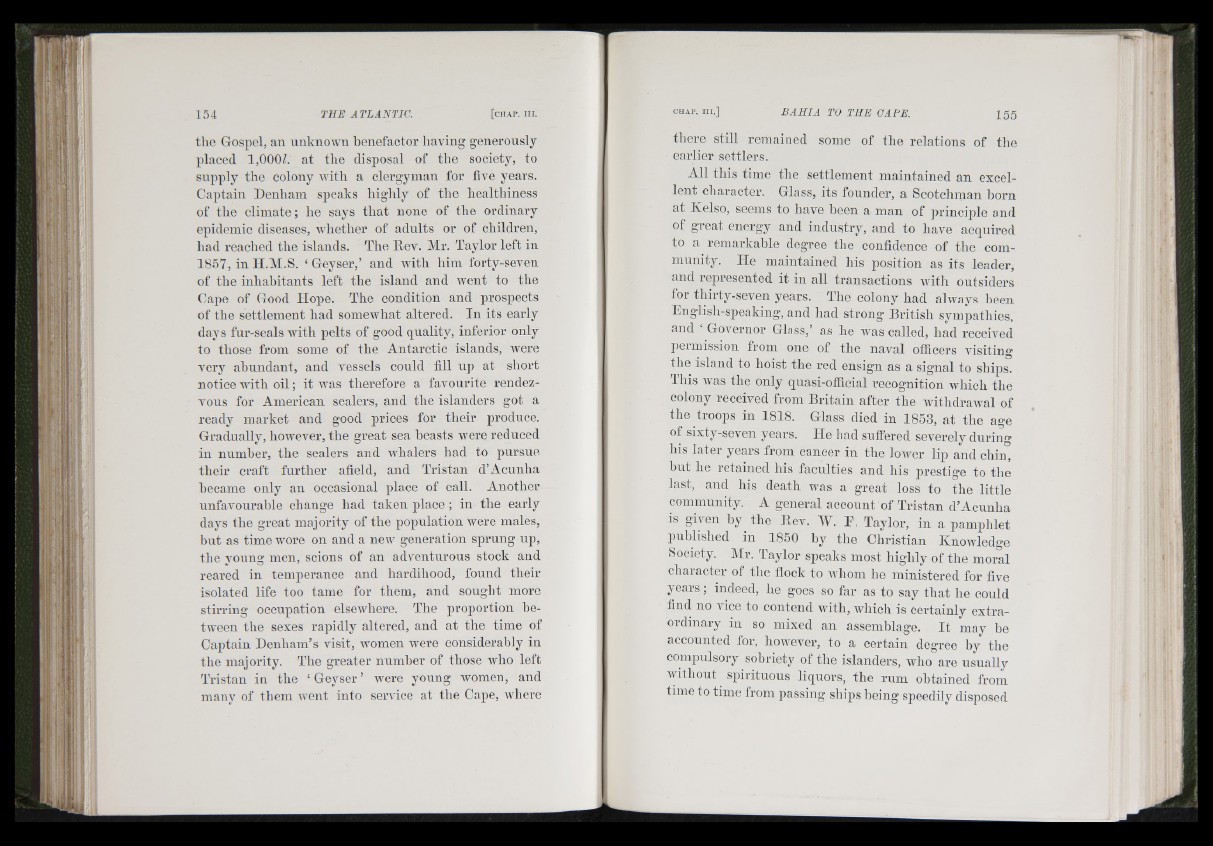
,■.
f '.e
;''i
ti Ul
ih
1 i' ■h! 5
■!iri
'■
( !| ¡
'i{ i "
the Gospel, an unknoAAni henefactor having generously
placed 1,000/. at the disposal of the society, to
supply the colony Avith a clergyman for five years.
Captain Denham speaks highly of the healthiness
of the climate; he says th a t none of the ordinary
epidemic diseases, AAdiether of adults or of children,
had reached the islands. The Bev. Mr. Taylor left in
1857, in H.M.S. ‘ Geyser,’ and AAdth him forty-seven
of the inliahitants left the island and Avent to the
Cape of Good Hope. The condition and prospects
of the settlement had someAvhat altered. In its early
days fur-seals Avith pelts of good quality, inferior only
to those from some of the Antarctic islands, Avere
very abundant, and A'essels could fill np at short
notice AA'itli o il; it AA'as therefore a favourite rendezvous
for American sealers, and the islanders got a
ready market and good prices for their produce.
Gradually, liOAvever, the great sea heasts AA'ere reduced
in nnmher, the sealers and Avhalers had to pursue
their craft further afield, and Tristan d’Acunlia
became only an occasional place of call. Another
unfaA'onrahle change had taken place ; in the early
days the great majority of the population Avere males,
but as time AA'ore on and a new generation sprung np,
the yonng men, scions of an adventurous stock and
reared in temperance and hardihood, found their
isolated life too tame for them, and sought more
stirring occupation elsewhere. The proportion between
the sexes rapidly altered, and at the time of
Captain Denham’s Ausit, AA'omen Avere considerably in
the majority. The greater number of those who left
Tristan iu the ‘ Geyser ’ Avere young Avomen, and
many of them Avent into service at the Cape, Avliere
there still remained some of the relations of the
earlier settlers.
All this time the settlement maintained an excellent
character. Glass, its founder, a Scotchman horn
at Kelso, seems to have been a man of principle and
of great energy and industry, and to have acquired
to a remarkahle degree the confidence of the community.
He maintained his position as its leader,
and represented it in all transactions Avith outsiders
tor thirty-seven years. The colony had ahvays heen
English-speaking, and had strong British sympathies,
and ‘ Governor Glass,’ as he was called, had received
peimission from one of the naval officers A'isiting
the island to hoist the red ensign as a signal to ships.
This Avas the only quasi-official recognition Avhich the
colony received from Britain after the AvithdraAval of
the troops in 1818. Glass died in 1853, at the age
of sixty-scA'en years. He had suffered severely during
his later years from cancer in the loAA'er lip and chin”
hut he retained his faculties and his prestige to the
last, and liis death was a great loss to the little
community. A general account of Tristan d’Acunlia
is given hy_ the Bev. W. E, Taylor, in a pamphlet
published in 1850 hy the Christian KnoAA'ledge
Society. Mr. Taylor speaks most highly of the moral
character of the flock to Avliom he ministered for five
y e a rs; indeed, he goes so far as to say th a t he could
find no vice to contend with, which is certainly extraordinary
in so mixed an assemblage. I t may he
accounted for, lioAA'ever, to a certain degree by the
compulsory sobriety of the islanders, who are usually
without spirituous liquors, the rum ohtained from
time to time from passing ships heing speedily disposed